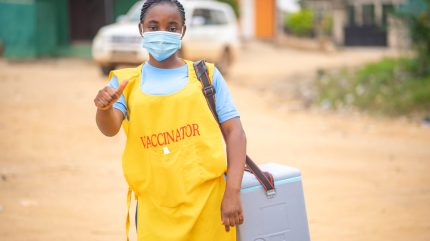
Bavarian Nordic will prioritise the production of two million mpox vaccines by the end of this year to help fight the disease in Africa.
The Danish biotech — manufacturer of the only mpox vaccine approved by the US Food and Drug Administration (FDA) — said that more than 250,000 doses have already been shipped to the epicentre of the outbreak, the Democratic Republic of Congo, with a further 500,000 pledged by other countries.

Discover B2B Marketing That Performs
Combine business intelligence and editorial excellence to reach engaged professionals across 36 leading media platforms.
The company added it could supply 13 million doses of the vaccine, known under the brand names Jynneos and Imvanex, by the end of 2025, as per a 12 September press release.
There are also considerations to transfer manufacturing to other companies in Africa and other parts of the world, adding that the company has identified another 50 million doses that, pending regulatory approvals and demand, could be supplied during the next 12-18 months.
Africa Centers for Disease Control and Prevention (CDC) previously stated that more than ten million doses could be required through 2025 to fight the outbreak in the continent, which is being propelled by the more dangerous variant clade Ib.
Africa CDC has reiterated the need for equitable vaccine access, saying that in previous outbreaks of the disease, such as the one in 2022, member nations were largely ignored on the international stage.

US Tariffs are shifting - will you react or anticipate?
Don’t let policy changes catch you off guard. Stay proactive with real-time data and expert analysis.
By GlobalDataBavarian Nordic’s prioritisation of the two million vaccines pledge means that existing orders for 2024 will be pushed to 2025 to “provide greater flexibility to fulfil additional urgent and imminent needs in other markets”. While some of the company’s planned revenue for 2024 will be deferred, new orders will offset this, meaning financial guidance for the year is unchanged.
The news comes a day after Africa CDC reiterated the need for a “coordinated response” to combat the outbreak.
In an emergency meeting held by the Pandemic Fund on 6 September to discuss steps needed to address the disease outbreak in Africa, the board agreed to fast-track support and establish “special financing” mechanisms for countries experiencing public health emergencies.
The support will build on existing processes and projects submitted by affected countries under the current $500m second Call for Proposals – an international funding pot used to aid countries in levelling up surveillance, laboratories, and public health workforces.
Africa CDC said that the upcoming funding would prioritise “a more inclusive approach”, criticising the previous round where only five of the 55 African nations received financial aid, as per an 11 September press release.
Hosted by the World Bank, the Pandemic Fund is a multilateral financing mechanism to provide multi-year grants to low and middle-income countries preparing for pandemics. The call by the Africa CDC comes as the virus appears in countries outside the continent, with India recording its first suspected mpox case three days ago. Africa CDC said the Pandemic Fund “must act with agility and speed to avert a global pandemic”.
In its most recent statement, Africa CDC pointed towards the vaccine inequalities seen during the Covid-19 pandemic, where more than 80% of vaccine doses were concentrated in high-income and upper-middle-income countries.
Africa CDC stated: “We cannot afford further delays; we must act now to safeguard the health and lives of African populations and prevent the further spread of mpox.”




